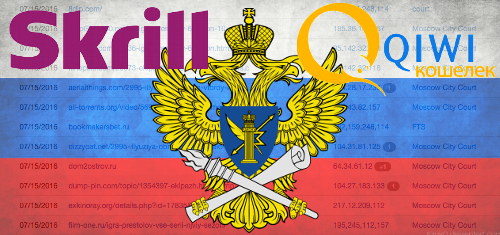 Russia’s communications regulator has put two major payment processing sites on its blacklist because of their links to online gambling.
Russia’s communications regulator has put two major payment processing sites on its blacklist because of their links to online gambling.
On Thursday, Russia’s Roskomnadzor agency slapped its scarlet letter on Skrill and Qiwi for (a) containing links to unauthorized online gambling sites and (b) facilitating payments for same.
Both sites remain active for the time being, as Qiwi posted a notice to its Facebook page saying that Roskomnadzor had given the company a 24-hour grace period in which to purge the offending gambling advertisements from their pages.
Skrill is familiar to Western online gamblers while Qiwi is a Cyprus-based processor that primarily operates in Russia and other Eastern European countries. Qiwi operates over 175k electronic payment terminals across Russia through its KIWI-Bank subsidiary.
KIWI-Bank has been designated as the processor for members of the Bookmakers Self-Regulatory Organization (SRO). Russia’s new online sports betting regime requires all betting payments to be made through a central hub, or TSUPIS. Members of rival bookmaker association First SRO utilize the Mobilnaya karta money transfer service for their own TSUPIS hub.
Konstantin Makarov, CEO of betting operator Bingo Boom and president of the Bookmakers SRO, told Betting Business Russia that Roskomnadzor’s action against Qiwi would “not in any way affect” the creation of the association’s TSUPIS hub. Makarov insisted that Qiwi was “actively working on the preparation of its resources in accordance with applicable law.”
NEW ENFORCEMENT MECHANISMS COMING
Anton Rozhkovsky, chairman of the First SRO’s TSUPIS board of directors, told Championat that his group welcomed the crackdown, calling it “a very important step in the fight against illegal gambling on the internet.”
Roskomnadzor has blocked over 6k gambling domains since it was handed new powers last October, but Rozhkovsky said overcoming such blocks through the use of mirror sites was simply “a question of desire and time” for both bettors and operators. However, Rozhkovsky said payment blocking was a more “tangible obstacle.”
Rozhkovsky predicted that Roskomnadzor would continue to go after online bookies’ ability to move money by employing “other mechanisms to directly block the payments.” Draft legislation was proposed last October to authorize these mechanisms and Rozhkovsky believes the bill will be passed during the Duma’s autumn session.
Rozhkovsky said the Duma was likely to authorize the establishment of “a register of illegal gambling companies” that would be forbidden from dealing with Russian banks and other electronic payment services.
Roskomnadzor’s actions against illegal gambling have become increasingly aggressive in recent weeks. In addition to those thousands of gambling domains, the Amazon Cloud service was taken offline for several days due to the presence of a single banner ad for 888Poker.
POKERSTARS DOESN’T KNOW THE MEANING OF THE WORD NYET
Speaking of poker, the Russian-facing site of Amaya Gaming’s PokerStars brand was also blocked last weekend, bringing the number of PokerStars-related domains blocked in the past couple months to over two dozen.
Just as it has done in the past, PokerStars quickly offered a workaround to its Russian players, noting that “for your convenience, we are constantly adding new links” to dodge such blocking maneuvers.
The fact that Russian federal agencies are continually blocking PokerStars domains would appear to be the very definition of a country that takes “affirmative, concrete actions to actively enforce laws that prohibit online gaming,” according to the New Jersey Division of Gaming Enforcement’s rules on what constitutes a forbidden ‘black’ market for its online licensees. But it appears New Jersey regulators are really only concerned when the laws being broken are American.